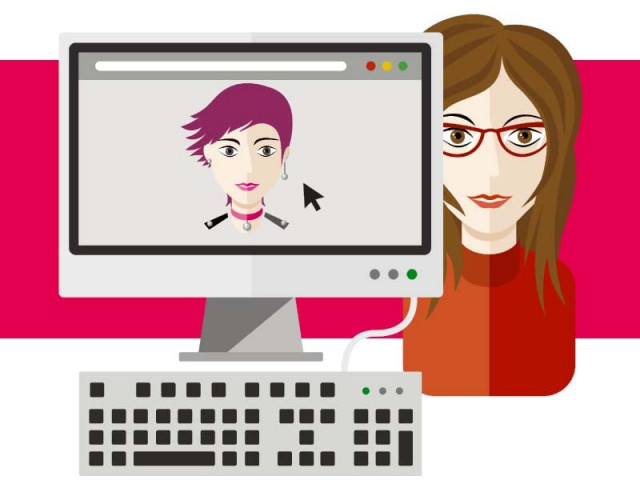The social media effect
Are we pretending to be different from what we really are?

DESIGN BY MARYAM RASHID
The Internet has brought the world closer and social media has rendered us just a tap-on-the-screen away from people across the world. But because we now live in such a global society, creating and maintaining an online presence has become crucial for promoting ourselves and expanding our social networks.
In this virtual life, perception is of utmost importance. For instance, we all have certain perceptions of ourselves, an ‘ideal self’ whom we wish to maximise and advertise to the rest of the world. As the world continues to evolve with the use of social media, the concept of presenting our ideal selves, as opposed to our real selves, has become widespread on social networks like Facebook, Twitter and Instagram.
Anyone with access to a computer will agree that most of us are much more outspoken, social and ‘cool’ on the Internet than we are in person. Online, we are people who are ‘followed’ and ‘liked’ by individuals we haven’t shared any physical interaction with for years. We can indulge in a political debate over Facebook but put us in the same room and we will be at a loss of words, beyond the basic ‘hello’. Long gone are the days when dual nationalities were an issue; it is dual personalities we ought to be worried about! While experts may consider this a psychological disorder, the concept of real vs Internet personalities has become the norm and is only likely to get worse. “It’s all such a farce,” says Tanya Qureshi, a dentist at a private clinic in Karachi. “People tag themselves at different locations and pictures to show others what they have been up to. It’s good to a certain extent but sometimes, it seems like gloating to me.” Shocking as it sounds, there are people who seem to live to advertise their personal lives online, getting too preoccupied taking pictures to actually enjoy the moment.
Granted that while there are indeed some whose online selves compliment their real lives, most of us are just presenting a prettier picture of how we wish our lives to be.
Fortunately, like student Haniya Rasool some are waking up to the harsh reality. “I once presented my brother with a few pictures of potential rishtas, to see if he’d like anyone of them,” shares Haniya. “But he responded saying he would jump off a cliff before marrying someone based on their Facebook profile. And I must admit now that he was right!”
This leads one to wonder if the Internet is a way for closet narcissists, sadists, psychopaths, stalkers, extremists, bullies and racists to let out their frustrations. “It’s easy to overcome inhibitions behind a screen,” explains Tanya. “When you don’t have to confront people physically, even timid people develop online personalities.” While Facebook and Instagram may cater to the whims of us social narcissists, Twitter is a different story. It has been found that the majority of the people behind the strong opinions tweeted on the website are actually reserved but opinionated introverts in real life. The platform offers its users the opportunity to take on controversial topics like religion and politics — topics which few can debate over personally without inciting anger. As Tanya puts it, “Twitter is a platform where one can interact with thousands of strangers. Here, you can loosen up, feel safe and express your views from behind the virtual barrier.”
Hibah Khan, a student of Educational Psychology at George Mason University, believes we develop alternate personalities simply because we want to be appreciated and acknowledged. “Social media affords us a voice that will be heard,” explains Hibah. “Social pressure is decreased online significantly as compared to organic social interaction.” Hibah also goes on to say that the issue of online and offline personalities is still relatively new and there are yet to be any proper, longitudinal studies to record its effects over time.
Nonetheless, for anyone looking for an outlet for their thoughts, there is no greater playground than the Internet and everything that comes with it. Considering that experts encourage expressing thoughts productively for mental and physical health, having a virtual ideal persona might actually be beneficial for us. Besides, if a few likes and positive comments make one feel better about themselves then so be it. So long as we are expressing ourselves positively and not inciting hate, we are free to co-exist online and offline.
Social media usage in the United States
According to a survey conducted by international mobile ad company InMobi back in 2012, an average American spends nearly 144 minutes on their phone daily. However, a large number of people check their phones every three minutes to keep abreast with any social media updates, notifications, messages and other alerts.
Published in The Express Tribune, Ms T, March 29th, 2015.



















COMMENTS
Comments are moderated and generally will be posted if they are on-topic and not abusive.
For more information, please see our Comments FAQ